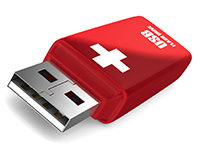by Wendy Angst
Whether a camping reunion to Colorado or a beach getaway to Florida, you can now travel with your personal health records (PHRs) wherever your reunion is. You can use PHRs to access health, medical and insurance information and have emergency information available. PHRs available to consumers include online websites, cell phone applications and portable USB flash drives. Family reunions offer a great opportunity to build a multi-generation family medical history, and PHRs are great repositories for such helpful information. People usually focus on their own records; but knowing a close relative’s allergies, past surgeries or current treatments helps you better understand your own health.
Traditionally, medical records have been maintained on paper. Today, electronic health records offer flexible options and several choices for storage, management and information sharing.
At a minimum, a PHR should enable you to record personal medical history information. A full PHR contains immunization records, lab reports, x-rays or other films, physician contact information, known allergies, lists of medications and pharmacy information that enable emergency doctors to treat a patient without having to wait for their medical history. An emergency PHR contains information such as blood type, physician’s contact information, a list of medications and known allergies. An online PHR provides consumers with secure access from any computer to their personal health information with the click of a mouse. This is helpful at a reunion, if the group is using a portable laptop to gather family histories. Some PHR users receive a sticker for their phone to alert professionals. Each application ensures secure, full access to health information. About the author
Wendy Angst, is general manager of CapMed, which makes an Online PHR and an icePHR (in case of emergency).





